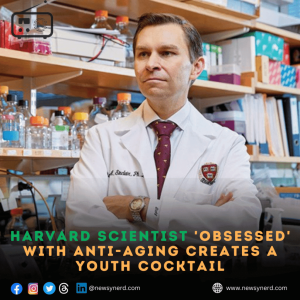Harvard scientist with an intense dedication to anti-aging research crafts a potent “youth cocktail.”
Discovering the Fountain of Youth: Reversing Aging’s Grip on Humanity.
Harvard scientist ‘obsessed’ with anti-aging creates a youth cocktail
Harvard Scientist David Sinclair
David Sinclair( Harvard university scientist) his team have discovered sixcocktail that can defy aging and age-related diseases in human cells in less than a week. They used a chemical method to make cells act younger, which was previously only possible through gene therapy.
A Harvard scientistDavid Sinclair interested in stopping aging and has created a special cocktail that can make cells younger again. Before, we could only slow down aging, but now it seems we might be able to reverse it. Aging is inevitable, but what if we could turn back the clock and make our cells younger again? That’s what a scientist from Harvard University says he has achieved with a special mix of chemicals.
The Harvard professors David Sinclair and his team (research scientist vs senior scientist) found six chemical cocktail that can defy aging and age-related diseases in less than a week. They used a chemical method to make cells act younger, which was previously only possible through gene therapy. They also developed a new way to test cells and distinguish between young, old, and senescent (aged) cells.

The lead researcher, David Sinclair, said that until recently, the best we could do was slow aging, but now they have discovered how to potentially reverse it.
The study showed that human cells can be made younger by using specific genes called Yamanaka factors. These factors can reprogram cells to act like younger cells and even grow new organs. However, there are concerns that this method might cause cells to become too young and turn into cancer cells.
Some scientists are skeptical about the claims made by the Harvard team and think they should have tested their chemical cocktails on animals first before making such bold statements. Others believe that the mix of chemicals might not be safe for use in people.
While the scientist, David Sinclair, is excited about his research and calls it a breakthrough, the scientific community is not entirely convinced yet. They want to see more evidence before accepting the claims.
Despite the excitement surrounding David Sinclair’s research, there are still doubts within the scientific community. Some biologists, like Matt Kaeberlein, argue that the team should have tested their chemical cocktails on animals to see if they improved age-related health or increasedlifespan before making such bold claims about their effects on aging.
Another researcher, Dr. Charles Brenner, expressed concerns about the safety of the cocktail, noting that some of the compounds used could pose risks, especially when combined.
As the debate continues, it’s essential to understand the study’s key findings. The researchers discovered that they could reverse cellular aging and rejuvenate human cells without altering the genetic code. By using the Yamanaka factors, they were able to restore youthful DNA patterns, transcript profiles, and tissue function. This process involves active DNA demethylation, which is a crucial step in the reversal of aging.
To support their findings, the team developed high-throughput cell-based assays, including transcription-based aging clocks and the nucleocytoplasmic compartmentalization (NCC) assay. These assays helped them distinguish between young, old, and senescent cells. Based on their tests, they identified six chemical cocktails that, in less than a week, successfully restored a youthful genome-wide transcript profile and reversed the cells’ transcriptomic age.
The rejuvenation achieved through age reversal is a significant breakthrough, not only through genetic means but also through chemical intervention. This has opened up exciting possibilities for anti-aging research and treatments.
However, as with any groundbreaking discovery, it’s crucial to approach it with a critical eye and conduct further studies to validate the results. The scientific community is cautious about accepting the claims without more evidence, especially since the implications of reversing aging could have far-reaching consequences on human health and longevity.
Still, it remains to be seen whether the claims made by the Harvard team will be widely accepted and replicated by other researchers.
As the scientific community waits for further evidence and validation, it’s essential to remember that the pursuit of anti-aging treatments has been ongoing for decades. Scientists have made significant progress in understanding the mechanisms of aging and its underlying processes, but finding safe and effective ways to slow down or reverse aging in humans remains a complex challenge.
The potential implications of successful anti-aging interventions are enormous. Extending human health span, the period of life spent in good health, could lead to a higher quality of life for older individuals, reducing the burden of age-related diseases and healthcare costs. Moreover, if aging could be effectively reversed, it could open up new possibilities for regenerative medicine and even organ transplantation, as cells could be rejuvenated and regenerated without the need for complex genetic manipulations.
However, caution is crucial in the field of anti-aging research. Unproven claims and unsupported promises can lead to false hope and potential harm to individuals who might seek untested interventions. Rigorous scientific testing and peer review are essential steps in determining the safety and efficacy of any new anti-aging approach.
Additionally, ethical considerations play a significant role in advancing anti-aging research. The pursuit of longevity should not overshadow other pressing health issues and priorities in society. Allocating resources and efforts to improve overall public health, prevent diseases, and address health disparities are equally important.
For individuals interested in promoting healthy aging, there are already proven lifestyle factors that can make a difference. Regular exercise, a balanced diet, sufficient sleep, stress management, and avoiding harmful habits like smoking and excessive alcohol consumption have been shown to have positive effects on overall health and longevity.
Harvard Scientist David Sinclair
As research progresses, it’s essential for the scientific community, policymakers, and the public to work together to ensure that anti-aging interventions are grounded in evidence and adhere to ethical guidelines. Responsible communication about the potential benefits and risks of such interventions is critical to managing expectations and fostering a realistic approach to the complex topic of aging.
 Newsy Nerd
Newsy Nerd

